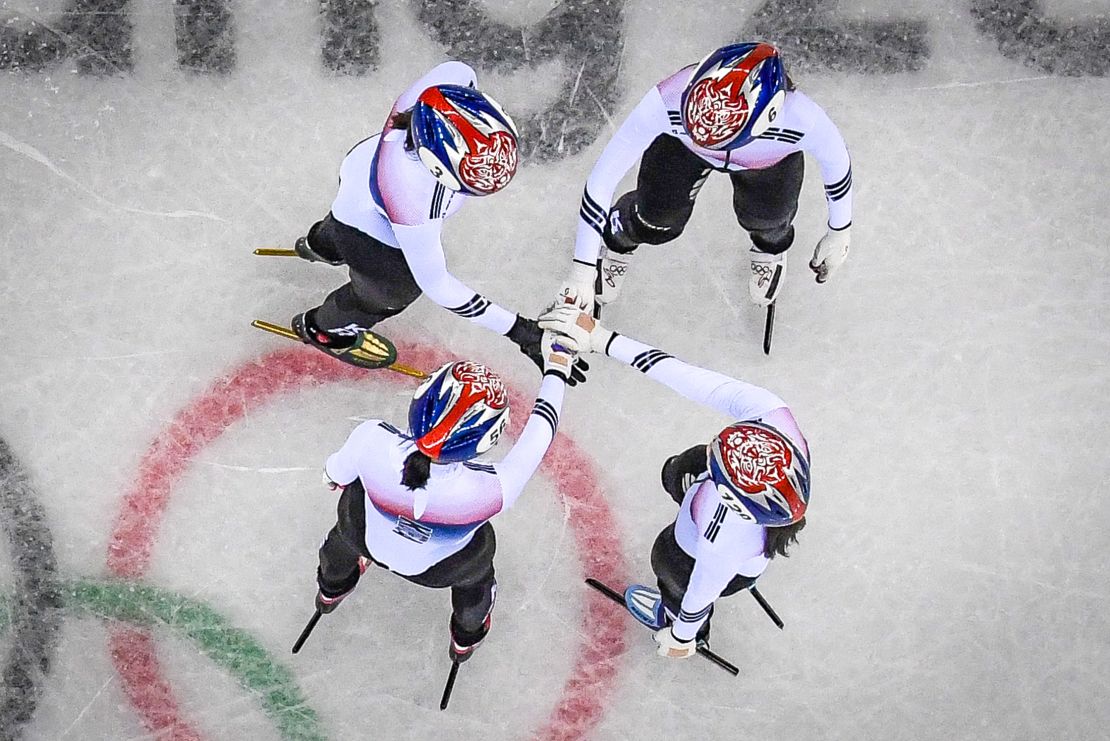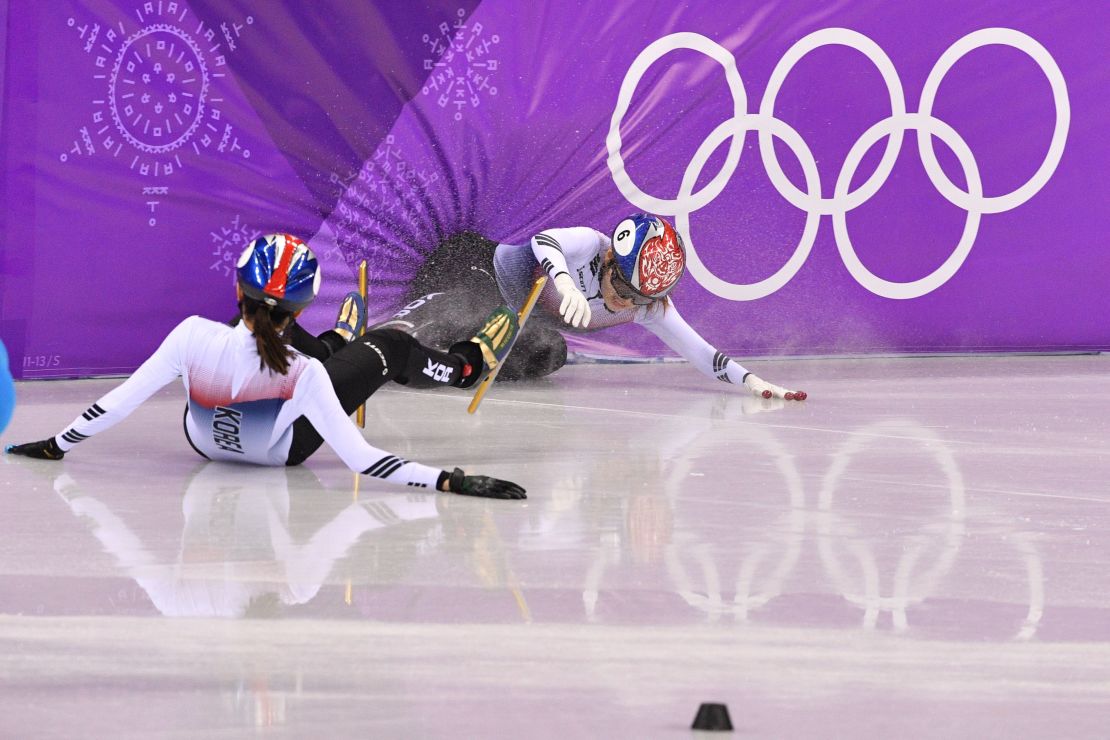The nervous 18-year-old sits picking furiously at her nails.
Once an Olympic speed skating hopeful, she is one of a number of women to come forward in recent weeks with stories of physical abuse and sexual harassment within one of South Korea’s most prestigious sports.
“I used to get called into the coach’s room, where she would hit me with a skate blade sleeve 10 to 20 times,” she said. “I suffered muscle rupture, severe bruises and split skin. My older brother was beaten with a golf club.”
“A” – she told CNN she was too scared to reveal her identity, but unwilling to stay silent any longer – said the abuse started when she was just 11. She tried to leave the skating team several times but was convinced to come back as she had huge potential. Her mother complained to local government officials about her daughter’s treatment and tried to rally other parents, but her efforts were unsuccessful.
“There is a small and powerful clique,” A said. “If I criticize my coach, my career as a skater is over. If I accuse my coach of crimes, I won’t be accepted onto a university or professional team. That’s how it works.”
She said the sexual harassment started when she was 15. A new male coach began kissing her on the cheek closer to her lips, hugging her repeatedly, and then began two years of texts professing his love for her.
“I felt it was dirty, I was young back then. Had I known how wrong and serious it was, I would have told my mom instead of keeping it to myself,” A said. “It makes me feel sad I couldn’t tell anyone about that.”
While A still struggles to make eye contact while talking about her experiences, she said she found strength to speak out because of the bravery of multiple Olympic gold medalist Shim Suk-hee, whose allegations of sexual abuse have rocked the world of speed skating and forced those in power – all the way up to South Korean President Moon Jae-in – to sit up and take notice.

Speaking out
Shim, a household name in South Korea and known internationally to fans of short track speed skating, said she was repeatedly raped by her former coach, Cho Jae-beom, from the age of 17.
Cho – who was found guilty of assaulting Shim and three other skaters last year and is serving a 10-month prison sentence – denies the new rape allegations.
Outside Cho’s sentencing hearing for assault in December, Shim said she hoped “no more people are victimized like me in the field of sports … whatever the reason, the violence must stop.”
The accusations of violence caused a stir, but the allegations of rape have sparked outrage.
“The recent series of testimonies about violence and sexual assault in the sports industry represent our shame that has been hidden beneath the glorious appearance of Korea as a sports powerhouse,” President Moon said at a senior advisers’ meeting this week.
Moon referenced previous cases over the years that failed to bring lasting change, a primary complaint of activists.
Yeo Jun-hyung, a former skater and coach, set up a support group for young skaters because he said accusations were repeatedly swept under the rug by officials and sports associations. Yeo said his sister was physically abused alongside fellow athletes 14 years ago. The two coaches involved apologized and resigned with no legal ramifications – one still works in the industry.
“Associations are more about serving the needs of executives and coaches,” Yeo told CNN.
Lee Kee-heung, head of the Korean Sport and Olympic Committee, this week apologized to the athletes, the public and businesses who supported the sports industry, blaming “systemic flaws” for repeated abuse being allowed to continue.
“We will root out the practice of coaches having absolute control over the future of their athletes and abusing that power,” Lee said.
Yeo said that many skaters who contact him for help are too afraid to make their accusations public as they want to continue skating and fear career ramifications.
“One person holds too much power in the skating world, so people are afraid of retaliation,” he said, adding the recent revelations are likely only the tip of the iceberg.

Cover up
Shim’s family wanted to come forward about the abuse she endured ahead of the Pyeongchang Winter Olympics, held in South Korea last February.
Shim briefly left the skating team – which would go on to win multiple medals – because she was unable to cope with the abuse. She later returned. According to lawmaker Sohn Hye-won, who has been investigating the case, an executive at the Korean Skating Union (KSU), Jeon Myung-gyu, pressured the family to keep silent. Sohn released audio allegedly of Jeon saying he prevented Shim’s family holding a press conference to air their allegations.
Jeon did not respond to a request for comment from CNN. He has since resigned from the KSU and is being investigated by the Ministry of Culture, Sports and Tourism. In a statement, KSU said it “apologizes to the public for all the troubles this case caused.”
In a voice recording provided to a government audit last year by Sohn, Jeon can be heard saying he worked to convince those around Shim to withdraw their support for her allegations.
Responding to a request for comment from CNN, the International Olympic Committee (IOC) in Lausanne, Switzerland, said it did not know of Shim’s claims before the Pyeongchang Winter Olympics, but added it would be in contact with the KSU and the country’s Olympic association to offer support in improving practices.
People think abuse ‘is natural’
The revelations from Shim and other skaters come as a resurgent women’s movement is demanding changes to South Korea’s notoriously patriarchal, conservative culture. Last year, tens of thousands of women took to the streets to protest the prevalence of non-consensual upskirt and spy camera filming, and young South Korean women are also pushing back against strict beauty standards.
This is increasing the pressure on the country’s sporting authorities to take action. Indeed, South Korea’s President, top officials and the IOC are all promising change. A special investigation has been launched; government officials said penalties for coaches found guilty of abuse will be strengthened and lifetime bans imposed both domestically and internationally.
All the attention, and the numerous athletes who have been brave enough to come forward, has victims feeling hopeful.
“In the past, numerous sexual misconduct and assault claims were uncovered but they were swept under the carpet,” said A, the 18-year-old skater. “But if other victims pluck up the courage to speak like I did, I think this time it may be solved.”
She has one concern about the focus of the criticism and investigations – that they are becoming too narrow.
“Now society and people are paying a lot of attention to sexual problems,” A said. “Inside the sports world, people think violence and verbal abuse are natural, athletes too. Even if they get hurt and find it hard, people don’t speak up about it.”
CNN’s Yoonjung Seo, Jake Kwon and Sophie Jeong contributed reporting.





















